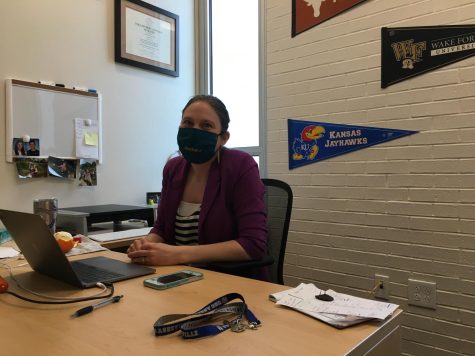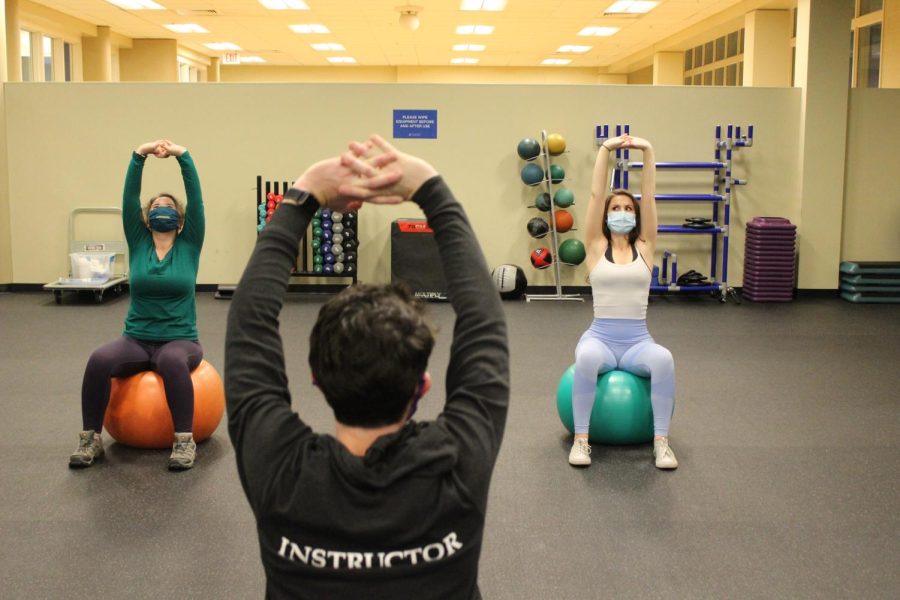Dealing with depression and anxiety at UNC Asheville
Exercise can be a great self care strategy for relieving stress.
February 22, 2022
To some students, the added stress that comes with leaving the nest for the first time can lead to depression and anxiety while simply trying to get by. Identifying symptoms and knowing when to reach out for help is the key to overcoming those negative feelings.
“A lot of students have left home for the first time and are learning how to take on new responsibilities and set up their own structure for life,” said Elizabeth McCorvey, a licensed professional counselor.
McCorvey works at the UNC Asheville Student Health and Counseling Center alongside five other counselors, each with different strengths and personalities they contribute. They offer sessions every two or three weeks, emergency crisis appointments and can link students and faculty to other community resources when needed.
“I became a counselor because I love learning about people and hearing their stories. I think the human experience is fascinating and messy and I love supporting people as they navigate life’s challenges,” she said.
McCorvey said there’s a multitude of reasons why people seek out counselors like her, ranging from seeking help for eating disorders, to challenging relationships and family trauma.
“The pressures students experience in college are unique because our society is obsessed with having young people figure out what they want to do for the next 50 years as adults, which makes no sense,” she said.
Because of the pandemic, McCorvey said the counselors turned to teletherapy as a way to help students access therapy in a safe way.
“We’re able to meet with people via video conferencing or telephone, so there’s no exposure for either of us due to the virus. Students are reporting higher levels of stress and anxiety, and many have lost loved ones,” she said.
Assistant Professor of Psychology Caitlin Brez said there could be genetic predispositions for anxiety and depression. Experiences with traumatic or negative life events, lack of support and many other environmental factors can also give rise to low feelings.

“It seems pretty clear the pandemic is worsening these experiences and we are seeing rates of anxiety and depression rise across the age demographic,” she said.
The professor shared in counselor McCorvey’s sentiments about students leaving their homes for the first time and the problems they face.
“They are working on making decisions about who they are, what they want to do and what kind of person they want to be, all while becoming less dependent on family and other supports and building up their own networks. Simply put, there’s a lot going on,” she said.
According to Brez, there are many strategies out there to help, and she suggests seeking out professional help through the Health and Counseling Center.
“There are hotlines people can reach out to so they can talk to someone anonymously. Other self-care strategies that may help include exercise, meditation, writing in a gratitude journal, spending time in nature and with others,” she said.
Brez said she believes an understanding of psychology and how minds work may help, as the nuances of human behavior can help find ways to reduce or manage anxiety or depression.
“Some people really like to have that deep understanding of themselves and how their body works. Others just need strategies to manage it,” she said.
Negative emotions like anxiety or depression are intricately linked to the field of psychology, according to Brez, and psychologists like her study these experiences to try and create better treatments for both.
“A lot of homesick friends of mine print out pictures and hang them around their rooms. I’ve also seen some friends invest some time with a professor or someone older than them that has been here longer. I imagine this helps create a community and a sense of belonging at a new place,” said Emily Phillips, a senior at UNCA
Phillips said they consider a big warning sign to be avoidance, whether that be skipping classes, staying up later than others just to have some quiet time, oversleeping or other self-isolating behaviors.
“Students recognize when they aren’t themselves and it causes them to lose touch in classes, with friends and family and the way they normally carry themselves,” they said.
Phillips said there’s so much pressure on students in and outside of classes that it’s easy to feel out of touch while navigating such an intense and impermanent stage of life.
“People reach out because they don’t want to feel how they do. It just happens, and a lot of the time we were never taught how to help ourselves when it does because a majority of people have never lived with the state of disequilibrium and independence that college leaves us in,” they said.
Lee Robinson, a junior at UNCA, said one of the prevailing causes of stress for her is demanding classes and the homework and projects that come with them.
“It’s tough when there’s so much expected of you. On top of that, a lot of people have to work to put themselves through school. I’ve got a part-time job and it’s still a lot for me to juggle,” she said.
With college comes a social life, and Robinson said the drama that can arise among friends and the pressure to attend social events can be pretty draining as well.
“For me, going outside really calms me down. Being in nature, especially somewhere where I’m isolated. It’s pretty cathartic to throw rocks at trees, yell really loud or run as fast as you can down a hill. One of my roommates really gravitates towards friends when they get stressed and their friends provide really great support,” she said.


![Brooke Pedersen [second from the right] and Luis Reyes [right] hold banners during the Wrap The Woods event.](https://thebluebanner.net/wp-content/uploads/2025/09/ELIZABETH_PRITCHITT_IMG_3470-1200x804.jpg)















